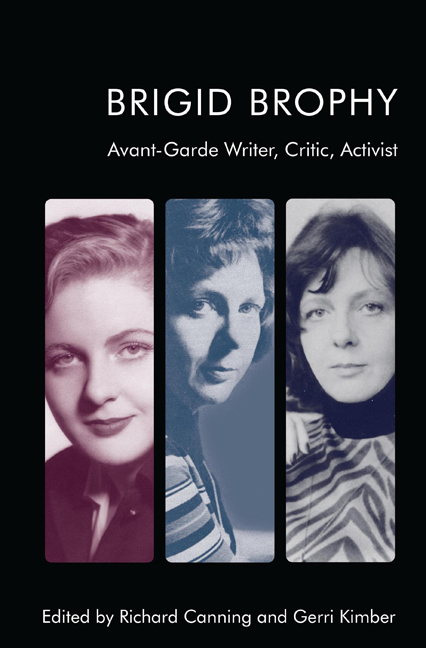Book contents
- Frontmatter
- Contents
- List of Illustrations
- Acknowledgements
- Introduction
- 1 Embodying the Fragments: A Refl ection on the Reluctant Auto-Biography of Brigid Brophy
- 2 Brigid Brophy’s Paradoxical World of Childhood
- 3 Intr oduction to ‘The Librarian and the Novel’
- 4 The Librarian and the Novel: A Writer’s View
- 5 Penetrating (the) Prancing Novelist
- 6 ‘Shavian that she was’
- 7 ‘Il faut que je vive’: Brigid Brophy and Animal Rights
- 8 Brigid Brophy’s Phenomenology of Sex in Flesh and The Snow Ball
- 9 Letter to Brigid
- 10 Encoding Love: Hidden Correspondence in the Fiction of Brigid Brophy and Iris Murdoch
- 11 ‘Heads and Boxes’: A Prop Art Exhibition Collaboration by Brigid Brophy and Maureen Duffy
- 12 Prancing Novelist and Black and White: Experiments in Biography
- 13 ‘Mo nster Cupid’: Brophy, Camp and The Snow Ball
- 14 ‘A Felicitous Day for Fish’
- 15 The Dissenting Feminist
- 16 A Certain Detachment?
- Notes on Contributors
- Index
8 - Brigid Brophy’s Phenomenology of Sex in Flesh and The Snow Ball
Published online by Cambridge University Press: 17 October 2020
- Frontmatter
- Contents
- List of Illustrations
- Acknowledgements
- Introduction
- 1 Embodying the Fragments: A Refl ection on the Reluctant Auto-Biography of Brigid Brophy
- 2 Brigid Brophy’s Paradoxical World of Childhood
- 3 Intr oduction to ‘The Librarian and the Novel’
- 4 The Librarian and the Novel: A Writer’s View
- 5 Penetrating (the) Prancing Novelist
- 6 ‘Shavian that she was’
- 7 ‘Il faut que je vive’: Brigid Brophy and Animal Rights
- 8 Brigid Brophy’s Phenomenology of Sex in Flesh and The Snow Ball
- 9 Letter to Brigid
- 10 Encoding Love: Hidden Correspondence in the Fiction of Brigid Brophy and Iris Murdoch
- 11 ‘Heads and Boxes’: A Prop Art Exhibition Collaboration by Brigid Brophy and Maureen Duffy
- 12 Prancing Novelist and Black and White: Experiments in Biography
- 13 ‘Mo nster Cupid’: Brophy, Camp and The Snow Ball
- 14 ‘A Felicitous Day for Fish’
- 15 The Dissenting Feminist
- 16 A Certain Detachment?
- Notes on Contributors
- Index
Summary
Ian McEwan's 2007 novella On Chesil Beach opens with a pair of young newly-weds, Edward and Florence, eating bad food in a Dorset hotel, prior to retiring to their room to consummate their marriage. When they do, in the book's calamitous climax, Edward suffers premature ejaculation: ‘He emptied himself over her in gouts, in vigorous but diminishing quantities, filling her navel, coating her belly, thighs, and even a portion of her chin and kneecap in tepid, viscous fl uid’. McEwan, who made his name with stories that revelled in all manner of sexual perversion – child sex abuse and murder, incest, sadism – here seems to be suggesting similar depths of gothic horror in the most commonplace, even vanilla of sexual encounters: the heterosexual marital bed.
Edward and Florence are products and victims of Britain's postwar puritanism, a time when, as the novella's opening line has it, ‘conversation about sexual difficulties was plainly impossible’. They are unexperienced, unenlightened and unprepared. It is 1962, the year before, as Philip Larkin famously asserted, sexual intercourse ‘began’. Before then it had been
A sort of bargaining,
A wrangle for the ring,
A shame that started at sixteen
And spread to everything.
McEwan's novella is a dramatisation of this state of affairs, with its handbooks for young brides talking of mucous membranes and glans, and ‘happily, soon after he has entered her’s, and, for Edward, rumours of ‘men and women in tight black jeans and black polo-neck sweaters [having] constant easy sex, without having to meet each other's parents’.After the disaster of Edward's coming too soon, and Florence's appalled reaction, and the frightened, thoughtless words that follow, their marriage is doomed. If only, you think, if only one or other of them had read Brigid Brophy's novel Flesh. Tragically, however, Edward and Florence married in July 1962, and Flesh wasn't published until later that year, by which time Edward and Florence were definitively divorced. But if Flesh can't save Edward and Florence, it can, at least, give the lie to Larkin. Sexual intercourse did begin before 1963, and Nancy and Marcus, Brophy's protagonists, are the proof.
- Type
- Chapter
- Information
- Brigid BrophyAvant-Garde Writer, Critic, Activist, pp. 119 - 136Publisher: Edinburgh University PressPrint publication year: 2020



